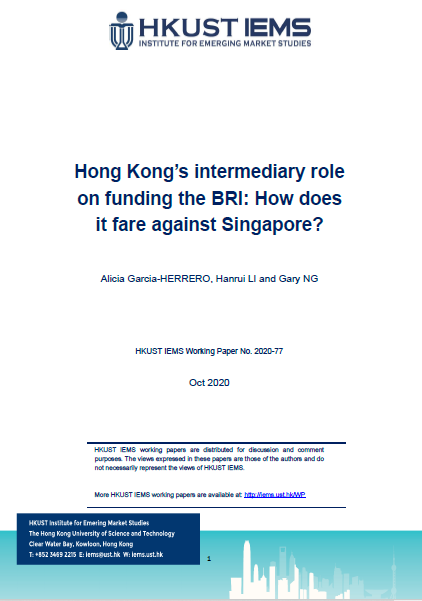External Publication
Hong Kong’s Intermediary Role on Funding the BRI: How does it fare against Singapore?
A look into the intermediary role of Hong Kong in financing cross-border Belt and Road Initiative projects and compare it with Singapore, a similar offshore financial center and competitor.
This working paper was originally published by Hong Kong Univesity of Science and Technology (HKUST) through its Institute for Emerging Market Studies (IEMS).

China has rolled out the red carpet of the Belt and Road (BRI) back in 2013 drawing inspiration from the Silk Road in ancient times. The grand plan focuses on infrastructure development and investments to enhance regional and global connectivity between China and the world. It includes a Silk Road Economic Belt on land and a 21st century Maritime Silk Road at sea. Given the cross-border nature of the projects and the sheer size of financing needed to accomplish its goals (estimated at around USD 5 trillion by Chinese authorities ), it seems clear that major offshore centers should play a role in intermediating savings towards these projects along the BRI countries. In Asia, Hong Kong and Singapore are the clear choices given the proximity and relationship with Mainland China. Hong Kong is well placed to finance the infrastructure projects under the BRI as it includes a large number of foreign banks which can intermediate foreign savings to that end (Garcia-Herrero, 2017). Other than the large asset pool in hard currency, Hong Kong is also the largest offshore RMB center in the world. Given that Chinese authorities have long tried to accelerate the use of the RMB as a financing vehicle for BRI projects, Hong Kong should benefit from its pole position in the offshore RMB market (Chan, 2015). Besides, Hong Kong’s large stock market with the largest amount of IPOs globally by value in 2019 should serve as a platform to provide equity finance to companies operating in the BRI geographies (HKGCC, 2019). Finally, as part of the Greater Bay Area (GBA), Hong Kong can have more venues than Singapore to integrate BRI investment with that of GBA, which has long been the most dynamic part of China. This should make Hong Kong as the intermediator for BRI financing more appealing for investors (KPMG, 2018). Cheung and Hong (2019) pointed though Hong Kong had the potential to be a financial hub in the BRI thanks to its transparent legal framework among other reasons (EY, 2016), but this result hasn’t happened partially due to the listing rule in Hong Kong. Infrastructure project companies are regarded as risky applicants by Securities and Futures Commission of Hong Kong. Therefore, several factors need to be fulfilled including but not limited to a large shareholding by state-owned enterprise in Mainland China, sovereign wealth fund, substantial listed company or globally active institutional investor. In this paper, we look into the intermediary role of Hong Kong in financing cross-border BRI projects (excluding projects in Mainland China) and compare it with Singapore, a similar offshore financial center and competitor. The scope of the BRI and the scarcity of data, especially for financing, make it difficult to conduct a detailed analysis so that our findings should be considered preliminary as they are based on rather scarce data. To that end, we focus on four venues for financing of international projects, namely syndicated loans, offshore bond issuance, equity financing and asset management and look at how much attention is being paid to the BRI geographies for each of these venues in Hong Kong and Singapore. The paper is divided as follows. Section 2 deals the objectives and data sources. Section 3-6 reviews the different channels, from syndicated loans to bond issuance, equity finance and asset management. Section 7 draws some policy conclusions for Hong Kong to further expand its role as intermediary of funds under the BRI. Finally, the appendix offers a detailed account of the data sources for our analysis.







